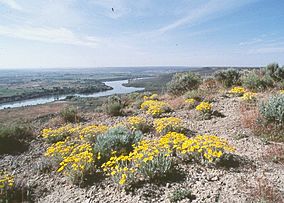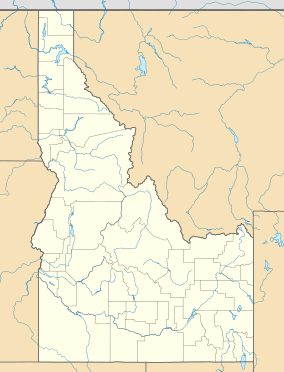Hagerman Fossil Beds National Monument facts for kids
Quick facts for kids Hagerman Fossil Beds National Monument |
|
|---|---|
|
IUCN Category III (Natural Monument)
|
|

View over Snake River in the National Monument
|
|
| Location | Twin Falls County / Gooding County, Idaho, United States |
| Nearest city | Hagerman, ID |
| Area | 4,351 acres (17.61 km2) |
| Authorized | November 18, 1988 |
| Visitors | 25,982 (in 2016) |
| Governing body | National Park Service |
| Website | Hagerman Fossil Beds National Monument |
| Designated: | 1975 |
The Hagerman Fossil Beds National Monument is an amazing place in Idaho, near the town of Hagerman. It's like a giant treasure chest filled with fossils from a time called the Pliocene epoch. This was about 3 to 4 million years ago! The Monument covers about 4,351 acres (17.6 square kilometers).
This area is super important because it has one of the richest collections of fossils from the Blancan North American Land Mammal Age. Scientists have found fossils from at least 200 different kinds of animals here. The most famous discovery is the Hagerman horse, also known as Equus simplicidens. This site has the largest group of these ancient horse fossils ever found! The fossil beds, including a special spot called the Smithsonian Horse Quarry, became a National Natural Landmark in 1975. Later, in 1988, it was officially named a National Monument.
Contents
Exploring Ancient Life at Hagerman
Hagerman Fossil Beds National Monument helps us understand what life was like millions of years ago. Scientists study the fossils to learn about ancient animals and the environments they lived in.
Sister Parks: Connecting Continents
In 2014, Hagerman Fossil Beds National Monument became "sister parks" with Sibiloi National Park in Kenya. This means they work together to share knowledge and help each other. This partnership helped send three students from Kenya to a special field school called Koobi Fora. There, students from all over the world learn about ancient history, rocks, and early humans in East Africa.
The PET Project: Uncovering Earth's History
In 2016, a special research project called the Hagerman Paleontology, Environments, and Tephrochronology (PET) Project started. "Paleontology" is the study of fossils, "Environments" looks at ancient habitats, and "Tephrochronology" is a way to date things using volcanic ash. This project helps scientists figure out the exact age of different fossil sites at Hagerman. It also helps them imagine what the ancient landscapes looked like during the Pliocene. The PET Project is a team effort between the park's former paleontologist and scientists from the US Geological Survey.
New Visitor Center and Research Building
In 2021, Hagerman Fossil Beds National Monument started a 25-year partnership with the Idaho Department of Parks and Recreation. This group manages several state parks nearby. A new visitor center at the Billingsley Creek unit of Thousand Springs State Park opened in 2022. It has exciting new fossil exhibits and hosts fun ranger programs. Also, in 2022, the Monument built a new, modern building for research, storing fossils, and preparing new fossil finds. This helps scientists study and take care of Hagerman's amazing fossil collection.
Amazing Fossils Found at Hagerman
Many incredible fossils have been discovered at Hagerman. These finds help us piece together the puzzle of ancient life.
- Hagerman Horse: The most famous fossil is the Hagerman horse, Equus simplicidens. It was once called Plesippus shoshonensis.
- Ancient Camels: Scientists have found fossils of Camelops, an extinct type of camel that used to live in North America.
- Oldest River Otter: The fossil of Lontra weiri is the oldest known New World River otter. It's likely an ancestor to the river otters we see today.
- Giant Bear: A very old type of bear called Agriotherium has also been found here.
- Early Coyote: One of the earliest examples of a coyote-like animal, Canis lepophagus, was discovered at Hagerman.
- Many Other Animals: Besides these, the site has a rich collection of other mammals, birds, fish, amphibians, turtles, and even tiny invertebrates.
See also
- National Parks in Idaho
- List of national monuments of the United States
 | George Robert Carruthers |
 | Patricia Bath |
 | Jan Ernst Matzeliger |
 | Alexander Miles |



